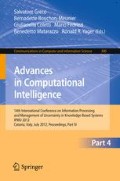Abstract
In the modern distributed systems, one of the most important targets is to resolve the job scheduling problem, optimizing the solution. In fact, in a concurrent environment such as distributed systems, jobs synchronization access to shared resources allows CPU time optimization. So, in order to solve this problem, we modeled a new scheduler based on a job scheduling game, in which multiple jobs concur to use multiple CPUs as players of this game model. Every single job payoff is related to total job completion time minimization, allowing system throughput maximization. The implemented model provides integration of Nash Equilibrium to MiniMax solution inspired by the "folk theorem" of Game Theory. This new algorithm has been tested, and results validate decrease of Nash Equilibrium inefficiency for the proposed distributed model.
Access this chapter
Tax calculation will be finalised at checkout
Purchases are for personal use only
Preview
Unable to display preview. Download preview PDF.
References
Myint, C.C., Tun, K.M.L.: A Framework of Using Mobile Agent to Achieve Efficient Load Balancing in Cluster. In: Proceedings of 6th Asia-Pacific Symposium on Information and Telecommunication Technologies, APSITT 2005, November 10, pp. 66–70 (2005), doi:10.1109/APSITT.2005.203632
Spata, M.O.: A Nash-Equilibrium Based Algorithm for Scheduling Jobs on a Grid Cluster. In: WETICE 2007, pp. 251–252 (2007)
Spata, M.O., Pappalardo, G., Rinaudo, S., Biondi, T.: Agent-Based Negotiation Techniques for a Grid: The Prophet Agents. e-Science 149 (2006)
Spata, M.O., Rinaudo, S.: A scheduling Algorithm based on Potential Game for a Cluster Grid. JCIT Journal of Convergence Information Technology (2009)
Patrone, F.: Decisori razionali interagenti. Una introduzione alla Teoria dei Giochi - Edizioni PLUS, Pisa (2006) ISBN: 88-8492-350-6
Osborne, M.J., Rubinstein, A.: A Course in Game Theory, Par. “Strategic Games”, pag. 9,11,14. The MIT Press (July 12, 1994)
Nash, J.: Equilibrium points in n-person games. Proceedings of the National Academy of Sciences 36, 48–49 (1950)
Ferguson, D., Nikolaou, C., Sairamesh, J., Yemini, Y.: Economic models for allocating resources in computer systems. In: Clearwater, S. (ed.) Market-Based Control: A Paradigm for Distributed Resource Allocation. World Scientific, Hong Kong (1996)
Kwok, Y.-K., Song, S., Hwang, K.: Non-Cooperative Grids: Game Theoretic Modeling and Strategy Optimization. Submitted to IEEE Trans. Parallel and Distributed Systems (December 2004)
Foundation for Intelligent Physical Agents, FIPA Agent Management Specification & Support for Mobility Specification, Geneva, Switzerland (October 2000), http://www.fipa.org
Nash, J.: Equilibrium points in n-person games. Proceedings of the National Academy of Sciences 36, 48–49 (1950)
Von Neumann, J.: Zur Theorie der Gesellschaftsspiele. Math. Annalen. 100, 295–320 (1928)
Vale, Z.A., Morais, H., Khodr, H.: Intelligent multi-player smart grid management considering distributed energy resources and demand response. In: 2010 IEEE Power and Energy Society General Meeting, pp. 1–7 (2010), doi:10.1109/PES.2010.5590170
Mohsenian-Rad, A.-H., Wong, V.W.S., Jatskevich, J., Schober, R.: Optimal and autonomous incentive-based energy consumption scheduling algorithm for smart grid. In: Innovative Smart Grid Technologies (ISGT), pp. 1–6 (2010), doi:10.1109/ISGT.2010.5434752
Ibars, C., Navarro, M., Giupponi, L.: Distributed Demand Management in Smart Grid with a Congestion Game. In: First IEEE International Conference on Smart Grid Communications (SmartGridComm), pp. 495–500 (2010), doi:10.1109/SMARTGRID.2010.5622091
Aumann, R.J.: Survey of repeated games. In: Aumann, R.J. (ed.) Essays in Game Theory and Mathematical Economics in Honor of Oskar Morgenstern, pp. 11–42. Wissenschaftsverlag, Bibliographisches Institut, Mannheim, Wien (1981)
Author information
Authors and Affiliations
Editor information
Editors and Affiliations
Rights and permissions
Copyright information
© 2012 Springer-Verlag Berlin Heidelberg
About this paper
Cite this paper
Spata, M.O., Rinaudo, S. (2012). A Job Scheduling Game Based on a Folk Algorithm. In: Greco, S., Bouchon-Meunier, B., Coletti, G., Fedrizzi, M., Matarazzo, B., Yager, R.R. (eds) Advances in Computational Intelligence. IPMU 2012. Communications in Computer and Information Science, vol 300. Springer, Berlin, Heidelberg. https://doi.org/10.1007/978-3-642-31724-8_65
Download citation
DOI: https://doi.org/10.1007/978-3-642-31724-8_65
Publisher Name: Springer, Berlin, Heidelberg
Print ISBN: 978-3-642-31723-1
Online ISBN: 978-3-642-31724-8
eBook Packages: Computer ScienceComputer Science (R0)

